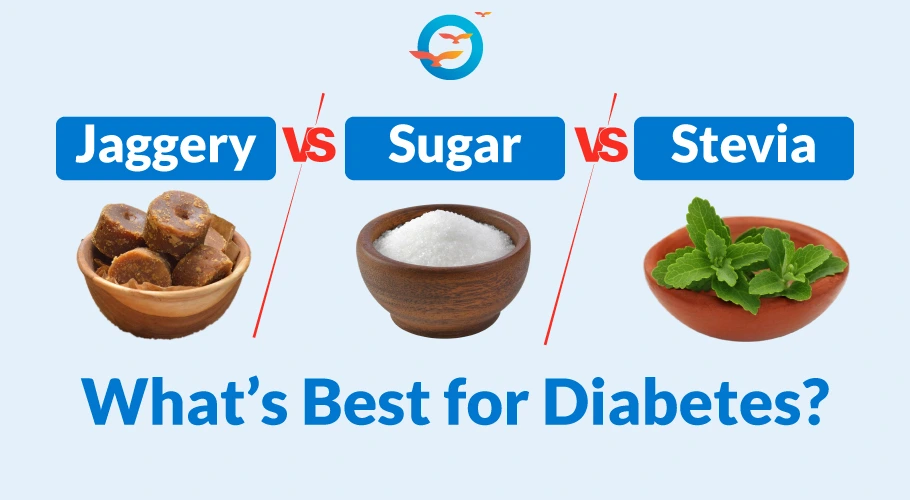Jaggery vs Sugar vs Stevia: What’s Best for Diabetes?

Managing diabetes often means rethinking sweetness. From tea and coffee to desserts, the choice of sweetener can directly impact blood sugar levels. The big question is: Which is the best sweetener for diabetics jaggery, sugar, or stevia? Let’s break it down based on science, taste, and health impact.
What Are the Differences Between Sugar, Jaggery, and Stevia?
1. Sugar – The Familiar Culprit
Refined white sugar is the most common sweetener but has a high glycemic index (GI ~65), causing rapid blood sugar spikes. According to the American Diabetes Association (ADA), regular consumption of sugar offers no nutritional benefit and contributes to weight gain and poor glucose control.
2. Is Jaggery Healthier Than Sugar for Diabetes?
Many believe jaggery (gur) is a “healthier sugar,” but for people with diabetes, it’s not much different from refined sugar.
- GI: 70–80 (often higher than sugar) as reported in studies from the National Institute of Nutrition, India.
- Contains trace minerals like iron and magnesium but still causes significant glucose elevation.
- Black jaggery or “organic jaggery” may be marketed as better, but they too are not suitable for blood sugar control in diabetes.
3. Why Is Stevia the Best Option for Diabetics?
Stevia, a plant-based sweetener approved by the U.S. Food and Drug Administration (FDA) and recognized by the World Health Organization (WHO), contains no calories and a GI of 0, making it the most diabetes-friendly option among the three.
- Does not raise blood sugar levels.
- Safe for long-term use in moderate amounts (as supported by ADA).
- Suitable for tea, coffee, and even cooking.
Which Sweetener Is Healthier for Diabetes?
- Sugar: Worst option spikes glucose, adds empty calories.
- Jaggery: Slightly more minerals but equally harmful for diabetics when used in regular amounts.
- Stevia: Safest for sugar control and weight management.
Verdict: If you are looking for a healthy sweetener for diabetics, stevia is the clear winner.
What Are the Best Tips for Choosing Sweeteners?
- Avoid adding any form of sugar or jaggery in daily beverages like tea, coffee, or milk.
- If using stevia for diabetics, choose pure or natural extracts instead of blends with artificial additives.
- Gradually reduce your dependency on sweetness & your taste buds will adapt over time.
- Watch for hidden sugars in processed foods even “jaggery sweets” can significantly raise blood sugar.
What Is the Healthiest Sugar Substitute for Diabetics?
The best sweetener for diabetics is one that keeps your glucose levels stable while satisfying occasional cravings. Stevia sugar for diabetics works best when paired with a balanced, low-GI diet rich in whole grains, proteins, and fiber.
Jaggery vs sugar? Neither is recommended if you’re aiming for diabetes reversal or tight sugar control. Stevia wins in both safety and health outcomes, as endorsed by the ADA and WHO.
Do you want to know more about stevia,visit our blog on Stevia: Uses and benefits.
FAQs
1. Is jaggery a healthier option than sugar for diabetes patients?
No. Jaggery has a high GI and raises blood sugar levels similar to refined sugar.
2. Can diabetics eat jaggery in moderation?
Occasionally, in very small quantities, but it is not recommended for regular use.
3. Is stevia safe for diabetics for daily use?
Yes. Natural stevia is safe, non-caloric, and does not affect blood sugar.
4. What are the healthiest sugar substitutes for diabetes management?
Stevia, monk fruit, and erythritol are considered better alternatives than sugar or jaggery.
5. Can stevia help in controlling blood sugar levels?
Yes. It has a GI of 0 and does not increase blood glucose, making it ideal for diabetes.

